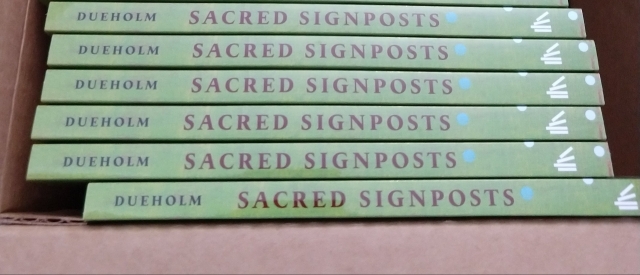 My own little stash of advance reader copies arrived last week. It was fun to see them, all ready to be picked up and thumbed through by just anyone. I have checked in throughout the process to make sure I can still tolerate my own writing, and I can. That’s reassuring. Some day I may even get my elevator pitch down cold.
My own little stash of advance reader copies arrived last week. It was fun to see them, all ready to be picked up and thumbed through by just anyone. I have checked in throughout the process to make sure I can still tolerate my own writing, and I can. That’s reassuring. Some day I may even get my elevator pitch down cold.
I’ve delivered a lot of words over the years. There have been quite a few sermons, obviously, and a good deal of freelance writing. I blogged rather compulsively for several years before I had any idea of how to go about making money or finding an audience with anything I wrote. I’ve been fairly scrupulous about keeping copies of the magazines I’ve had a piece in, and part of the reason I started this site was to post things that had disappeared from the internet. I keep most of my sermon manuscripts somewhere–on the hard drive, mostly, waiting for the oblivion of some great data jubilee.
It wasn’t until I’d been preaching and writing like this for a number of years that the pathos of John Ames’s sermons in Gilead, boxed up in the attic and waiting for his post-mortem bonfire, really hit home. I was exposed to a massive dose of T.S. Eliot at an off-label age, and I was perhaps too complacent with his running theme of the life and death of words and their meanings. “These things have served their purpose; let them be,” I learned by heart before I had made much of anything to be attached to in the first place. Now I’m a million-odd words deep into a vocation whose tangible products are subject to nearly instant forgetting, recycling, the half-life of modest virality, and the onset of linkrot, and I am tempted to be less philosophical.
The sermons can be put to one side. They are supposed to be oral first and only written down in a derivative sense, even if they happen to start on the page. And they are supposed to be the proclamation of another’s Word, not a showcase for my own writerly craftsmanship; to the extent that they are the latter, they ought to be forgotten, certainly by me.
My writing is harder to part with. So now I have a book, not just in the sense of a contractually-agreed-upon number of words written down somewhere, but a bound object that can be a little more robust to the passage of time. There is, of course, a memento mori in even this from the start, as my contract specifies what I may do to acquire unsold copies doomed to be pulped. It’s a poor sort of monument to oneself that will need, one day, to be toted from one home to another in a corrugated cardboard ark.
That, thankfully, is not the point of any of this. I set out to write something like an apology or defense of Christian practices and ended up writing a more urgent manifesto for presence. The word attached to the physical element makes the sacrament, as Augustine tells us, and it’s a very profound thought. The words may be thought of abstractly, spiritually, as disembodied thought, but the element has a place. There is no getting around the ordinary things, and the ordinary others with whom we share them, any more than there is getting away from the entirely extra-ordinary Other who ordains words, things, and others to our mutual love and edification.
This is going to strike some of you as obvious or even trite, so I will assure you that there is a good deal more to it than just that. But I also don’t want to take for granted exactly that thing in Christianity that is most contested and vexing in the world today, or maybe ever. We prize and have come to rely daily on the opposite of presence. People used to talk about the abolition of distance, but that’s just an ironic label for the reinforcement of distance. Social distance, certainly–between groups who are segregated by money, law, and habit–but also simple physical distance. We are connected in marvelous ways, but we are isolated and fearful in equal, and equally growing, ways. To be a Christian in the way that I’m asking readers to think of it requires, at least in the world I know, accepting things about the world and each other that are, for once, radically optional.
I’m getting excited about sharing this book, knowing full well that almost all of the sharing will happen in precisely that realm of verbal ephemera that I sometimes wish to escape. Not that one book or a million can do that for us anyway. The escape is closer at hand and probably less impressive than the cathedrals in the air we can freely build for ourselves.


[…] blogged before about why I wrote this particular book and about the unique sensation of holding the review copies in my hand. Now it’s out there for others to read and do with as they please. It has, of […]
LikeLike